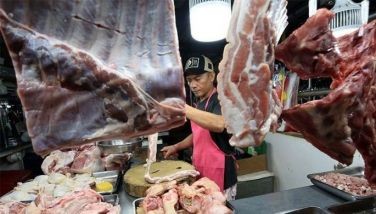Governance lessons from Pope Francis

There is this interesting observation made by the National Catholic Reporter: “Ever since Jesus appointed Judas to take care of the purse, the Church has had problems with finances. The Church may have been founded by Jesus, but it is run by men.”
How very true. Indeed, the Catholic Church has struggled with this problem of managing its finances in a way that would make it credible when it preaches the Gospel. But its lack of transparency on how it handles money through the centuries is at the root of its credibility problems.
Scandals over the handling of Church finances happen all the time. In recent years, a man known as “God’s banker” got enmeshed with shady characters and tarred by questionable financial deals. His body was eventually found hanging in a London bridge, a similar hanging end suffered by Judas.
God certainly deserves better from a Church that is supposed to shepherd His flock here on earth. But things got so bad in recent years that many suspect Pope Benedict XVI decided to resign because he can no longer take it and he feels inadequate in dealing with the financial mess involving influential members of the ruling Roman Curia.
When Pope Francis took office, the financial scandals of the Vatican were among the more important items waiting for his action. And the new Pope didn’t waste time. He reorganized the Curia and appointed a committee of trusted Cardinals to help him fix the financial mess.
And not a moment too soon! It was getting too embarrassing because the Vatican Bank was in the crosshairs of Italian bank regulators for money laundering among other shameful things.
Here is governance lesson number 1 from Pope Francis: act expeditiously to fix a mess. Just do it and spare no one. No past Pope had the nerve to act against powerful members of the Roman Curia. But Pope Francis knew he had to regain credibility for a Church whose main mission is to win souls for Jesus.
The Committee of Cardinals did not waste time either. Soon enough they had a good idea of what was wrong and proposed measures to fix things. The initial salvo of reform measures introduced in the Vatican bank served notice that it won’t be business as usual at the Vatican and its bank.
How did things get so bad in the Vatican when its business was supposedly being done by holy men of God? The short answer is that these supposed holy men are also still just human, subject to being tempted by the same things that we lesser mortals struggle with everyday: ambition, pride, self centeredness, greed and the rest of the deadly sins they warned us about.
There is also the reality that even those Cardinals and bishops with good intentions do not have the earthly skills of managing money. They were trained as priests. I doubt if the long years they spent in a seminary included subjects in financial management. But if you are made responsible for the finances of an organization as large as the Catholic Church, you better be as financially savvy as a Jamie Dimon.
Here in the Philippines the Catholic Church has the same credibility problems as the Vatican. Worse, our bishops are not inclined to be transparent in their handling of Church funds. And even when they are full of good intentions like the late Cardinal Jaime Sin when he allowed Monte de Piedad to do microlending, they could be fooled by people they trusted.
Monte de Piedad is a good example. The bank survived revolutions, World Wars and financial crises. Under Cardinal Sin in the early 1990s, the bank expanded its lending program to the poorest of the poor, targeting tricycle drivers and teachers coursed through Strategic Lending Investors or SLI owned and managed by people close to the late Cardinal.
A Newsbreak article gave a gist of what happened with Monte de Piedad. “In April 1997, Monte de Piedad declared a bank holiday after running into financial problems due to uncollectible loans extended to its Directors, Officers, Stockholders and Related Interests (DOSRI)…”
Wikipedia reports that “In an audit in January 1994, it was revealed that SLI had made loans to mostly fictitious persons. Soon after, in October 1994, the said lending conduit closed shop. Monte de Piedad temporarily ceased operations in April 1997 until the Bangko Sentral ng Pilipinas (BSP) brokered a sale of the bank to the Keppel Group of Singapore.
“The BSP conducted an audit which revealed the following: 1) the bank had failed to maintain individual ledgers for the P 2.5 million loan programs, 2) all the loans were coursed through SLI, a corporation that had a capitalization of only P100,000, and 3) the bank had asked SLI to be both its conduit and collector for the said loans, an arrangement that the BSP deemed one-sided and disadvantageous to the bank.”
Rappler recalled that Monte de Piedad experience in a report this week prepared for the visit of Pope Francis.
“The Monte de Piedad scam is one glaring example… The perpetrators of the scandal, one of them a former bishop and a retired monsignor, were left unpunished.”
Local bishops are not fond of transparency even if they are among the most vocal in demanding transparency for government officials. The bishops feel totally autonomous in the handling of Church funds and that they are not accountable to anyone, except the Pope.
Dioceses are supposed to be registered with the Securities and Exchange Commission to acquire a juridical personality. They are supposed to be filing financial statements yearly, but as Rappler pointed out the Roman Catholic Archdiocese of Manila has been delinquent, submitting its last statement in 1985.
Rappler reports: “At the diocesan level, financial monetary transparency has not been a strong virtue of the tax-free Church. Except for a chosen few, no one outside the diocese knows its financial status. At least at the parish level, some parishes post their income and expenses for everyone to see.”
A Church financial adviser consulted by Rappler said “those in the Church higher-ups have a tendency to resist financial scrutiny...
“The retired archbishop said any attempt to raise any issue on how Church funds are being handled is quelled at the root. ‘It is like questioning the authority of the bishop.’
“The Parañaque diocese is a case in point. In 2012, several restive parish priests asked the diocese for explanations of how and where money is being diverted after funds for social programs were slashed.”
Well… the Parañaque bishop refused to open the diocese’s books. The Apostolic Nuncio, the Pope’s representative, was even asked to intervene.
If what Pope Francis is now doing at the Vatican is any indication, utmost transparency will change how the Church will do business from now on. The Vatican has started to increase its scrutiny of the Vatican bank’s central accounting department and purchasing office, which handles everything from income and spending to property management.
“We are aiming at substantial transparency. There will be audits and these reports will be audited externally,” said Australian Cardinal George Pell, head of the Vatican’s recently formed Secretariat for the Economy.
Cardinal Pell told the Catholic News Service there is a need for more transparency, “checks and balances” and oversight by laypeople and the benefits of internationalizing the Vatican bureaucracy while reducing its overall size.
Cardinal Pell, a former archbishop of Sydney, told CNS that Pope Francis wants a “poor church for the poor,” but that “doesn’t necessarily mean a church with empty coffers, and it certainly doesn’t mean a church that is sloppy or inefficient or open to being robbed.”
“Before the end of the year we hope to appoint an auditor who’ll be completely independent here and to whom anybody can have recourse. We’re clarifying even further what I believe they call the “four eyes” principle, so that any significant piece of business cannot be conducted only by one person.
“We will be streamlining and improving budget procedures, we hope returning, within financial parameters, a whole lot of authority to the different congregations and councils. None of this is rocket science but we’re very well aware that when people donate to the church they expect the money to be used wisely, for good purposes.”
The question now is, how long will it take for the same governance reforms happening at the Vatican to take root in the local Catholic Church. For many Catholics, the short answer is obviously, not soon enough.
This brings us to the other governance measure of Pope Francis: lead by example. It is comforting to know that we have Pope Francis on our side.
Boo Chanco’s e-mail address is [email protected]. Follow him on Twitter @boochanco
- Latest
- Trending































